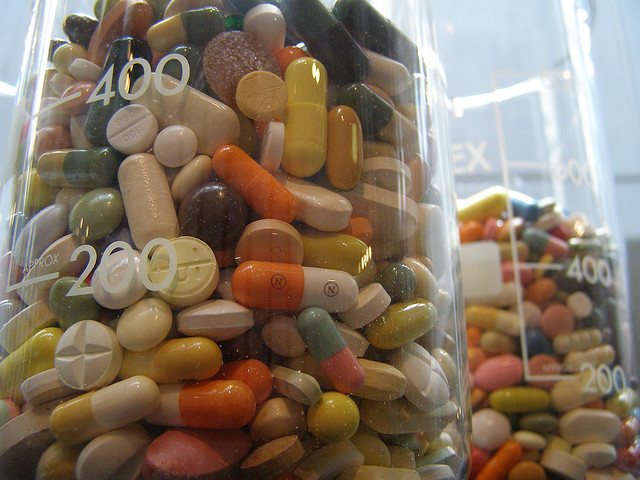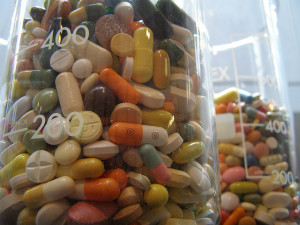Should We Stockpile Medications?

The situation I describe in my first novel, Chemicals, is nothing short of a “pharmaceutical apocalypse.” Drug cartel terrorists hit Big Pharma where it hurts: their medicine production and storage sites. This is a total wiping out of medicine for Americans. Which made me have to consider this question during my writing: should we stockpile medications?
I suffer from asthma, as does my main character, Aberdeen. One of the beta readers for Chemicals thought Aberdeen would stockpile medications, albuterol and flovent and prednisone in case her supply was compromised. I decided Aberdeen wouldn’t have a cache in the book because I don’t stockpile medications and I have asthma but more importantly the decision is in sync with her character. Years ago, I was one of the millions of Americans without insurance. My inhalers, costs paid out of pocket, would routinely set me back hundreds of dollars for 30-day supplies. Not only could I not afford to stockpile medications, I would ration them when I did have them. Steroids meant to keep my bronchial sacs working and my lungs open would be taken once a day instead of the doctor prescribed twice a day. I didn’t think my main character, a woman who moves into a rundown apartment to save money while her husband goes through grad school, would have the presence of mind and cash in her pocket to stockpile medications.

I’m not alone in my own inexperience with caching away drugs. Plenty of reports verify most Americans don’t have excess supplies or indeed, can’t afford to have them. An article written by Tara Culp-Ressler for Think Progress points out that prescription drug expenditures have dropped on average for Americans. Not because we are getting healthier, but because many of our poorer citizens and the uninsured can’t afford their medications. And this all comes at a time when Big Pharma’s profits are skyrocketing. Read the full article here.
Still, my habits and what uninsured Americans are doing don’t necessarily reflect on the habits of people with well-paying jobs. I chose to set Chemicals in a future America suffering the effects of a depression. Quality jobs are unavailable to many, forcing them to spend their money on subsisting, not stockpiling medications for some nebulous disaster down the pike. Still, I wanted to get a clearer picture of the habits of those with money. I talked to friends and family and learned there wasn’t a typical answer to my question of whether or not they had an extra cache of prescription drugs in their homes. About half of the people I spoke to said they had at least an additional month of medicine in their home and the other half went month by month with their supply. The reasons for not storing up ranged from concerns about prescriptions expiring and their efficacy if they did, disbelief that an event which would make drugs unavailable would ever occur, money used on other resources and legality.
Whether storing prescription drugs is legal or not isn’t the easiest question to answer. One of think there would be a clear yes or no to the query but try Googling that question and see what you come up with. Several medications can be stockpiled, but only with the prescribing doctor’s knowledge. A patient must convince a doctor they need a script for several months storage over immediate need and each doctor will have to judge the validity of their patient’s wants. Lying to a doctor to score medications you may not need now, but you could use in the event of a life and death situation, can get you locked up as a felon. Controlled substances such as prescription pain killers and Sudafed, which can be used to make methamphetamine, cannot be cached. In fact, many pharmacies will not fill prescriptions for these medications until the end of the month when they assume your supply of the pills is near exhaustion. This poses some frightening prospects for individuals dependent on Oxycontin or other pain killers in the event of a crisis which outlasts the pills in their bottles. Some individuals have created ways around stockpiling medications. An interesting, survivalist read about how to get a script to last you months can be read here.
Still, there is hope for Americans if the shit every does hit the fan in the form of the CDC’s National Strategic Stockpile. This is a federal government program aimed at alleviating a dearth of medicines and medical supplies in the event of terrorist attacks, epidemics, and natural disasters. There are warehouses full of drugs to treat what ails us and they’re given freely (only during a crisis do we get medicine from our government for free…) and distributed by federal, state and local officials in trying times. The CDC says it has enough medication in these caches to dole out to several major US cities at the same time.
While writing Chemicals, I knew the terrorists bombing the chemical plants of Big Pharma would also have coordinates on these storage facilities containing drugs meant to mitigate the fallout of a disastrous event. The drug cartels in the world of Chemicals take out the caches along with the production lines. However, what if a smaller-scale event were to take place? One that didn’t reach from coast to coast like the events in Chemicals? Even in a less catastrophic event, can the CDC’s National Strategic Stockpile truly meet the needs of American citizens who don’t stockpile medications? And what of people who do stockpile medications but their new circumstances or injuries make them dependent on drugs such as pain killers or antiseptics they didn’t need before the chaos?
It’s a question I can only speculate upon, of course. But I have my doubts. During the recent Balitmore riots, neighborhoods were left without operable pharmacies. Because the first places to get looted and pillaged in a crisis after supermarkets are pharmacies. And this is exactly what happened. Diabetics, like the characters Myrtle and Louis Dover in Chemicals, weren’t able to get their insulin and had to travel long distances to hospitals for emergency treatment. It was eerie to see my fiction mirrored back to me in current news. Did the CDC arrive in these neighborhoods and distribute medications? If they did, it seems they weren’t there in a timely enough fashion. And all those stolen drugs which should have gone to treat the sick? Baltimore’s Police Commissioner Anthony Batts says hundreds of thousands of pills are keeping people high and contributing to soaring homicide numbers.
The real fear comes when we blow up this situation and think of every city in America reeling from a lack of medicines, hospitals swamped with the sick and un-medicated, desperation setting in. I sure hope the National Strategic Stockpile can handle such a scenario but a supply of medicines of such a grand size seems a bear for our government to bankroll and refresh when medicines hit their expiration dates. Not to mention the logistical nightmare getting the medicine to the people in need and out of the hands of those who only aim to profit or exploit.
It’s funny, but even after writing Chemicals, I still don’t stockpile medications. I have one emergency inhaler and one steroid inhaler. This may be a foolhardy mistake and I could stand to stock up for at least a few months now that I have access to medical insurance. But I still think often of the people in this country who struggle to feed their families let alone have excess pharmaceuticals at the ready in case of disaster. Of course it’s a good idea to stockpile medications if you can afford to do so and those medications can be legally cached, but as we so often see in our daily lives, most of our imaginings of what’s to come in the future rarely mesh with the reality down the road. We might plan for a tornado to rip through our town someday, but we might not see the oncoming outbreak of Bubonic plague. Preparations only go so far and are only so useful when they apply to the chaos at hand. We can have our daily medications for three months ahead of time, but what if resources aren’t restored in three months? What if we contract some new pathogen in the interim? What if, what if…
We hope the National Strategic Stockpile can accommodate all those “what ifs.” If not, well, that’s the premise of Chemicals.
Ready for a fictionalized take on the fallout of America’s drug dependence? Read more about Chemicals here.
Stay in the know by subscribing to my email list. Get exclusive stories, secret chapters and updates!
Asked friends and family if they have a cache of medicine and your own habits with asthma medication, insurance and non-insured.
Strategic National Stockpile: would this work on a national scale, is it targeted to more general, epidemic medical threats not everyday life? Dubious after what happened in Baltimore and other situations like Hurricane Katrina. Pick apart the “what you should know” section.
Plans on individual level, like food storage? Sites for that? Efficacy and legality along with certain drugs you won’t be able to stockpile, such as script pain medicines. “is it illegal to stockpile medication” Controlled substances are regulated by federal law and it is illegal to have more than a certain quantity in your possession. In fact, pharmacies will not even fill your next month’s refill until just a few days before they calculate your current month’s supply is used up.
Costs for individuals on drugs. 500,000 spend $50,000 on drugs, after
